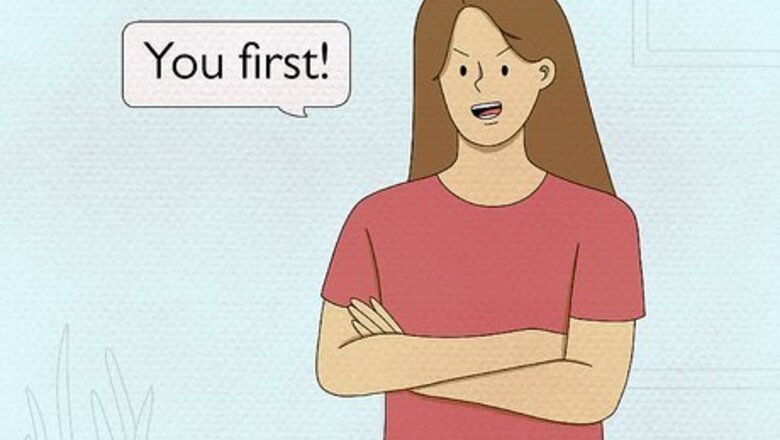
views
- Simple, snappy comebacks are great: “You first,” “Make me,” and “No” can catch people off-guard and show them they can’t push you around.
- Funny comebacks can be great for friends, siblings, and bullies. “Are you gonna cry if I don’t?” and “What are you? 5 years old?” can disarm people quickly.
- Comebacks like “Make me” and “Ha ha ha” can be flirty since they provoke a response.
- Laughing or ignoring people can be great power moves, since they show that you’re not easily intimidated.
“You first.”

Catch them off-guard with this snappy reply. If they’re just kidding, it could make them laugh. And if they’re being mean, it’ll show them you won’t be silenced so easily. For added effect, say “You first” with a completely straight face. Deadpanning is a subtle way to push back when someone is trying to intimidate you.
“Why don’t you lead by example?”

Use this on friends, older siblings, and people who are supposedly more mature than you. Not only is it a snappy comeback, but it disarms them by mocking their so-called “maturity.” Bonus points if it makes other people around you laugh. If they keep saying mean things, you can put your hand up and say, sarcastically, “Thanks for the example, you’ve done a great job.”
“What are you? 5 years old?”

Remind them that “shut up” is a pretty immature thing to say. Is “Shut up!” all they could think of? Do they not know any bigger words? Follow up with these questions to really get under their skin. This one could really drive someone nuts, especially if they’re your sibling or close family member. Use it with caution!
“No.”

Surprise them with this deadpan, one-word comeback. It’s perfect for bullies and other people who are just plain mean. Seriously, what are they gonna do? Ask you again, politely? Avoid using this on adult family members or people in positions of authority. In those situations, it’s better to be funny than blunt.
“Are you gonna cry if I don’t?”

Call their bluff and tease them while you’re doing it. Think about it: what were they planning to do if you said no? Chances are, they don’t have a plan because they weren’t expecting your comeback. Be careful if you think someone could act out dangerously. While you’re never responsible for someone else’s behavior, you should always look out for your own safety. Talk to a responsible person—like a trusted adult or authority figure—if somebody’s behavior makes you uncomfortable.
“That’s clever. Did you come up with that all by yourself?”

Show them that they’re not just being childish, but unoriginal too. Can’t they think of anything better?
“Looks like somebody needs a nap.”

Remind them that they sound like a cranky toddler. Maybe a nap will cheer them up. And as a bonus, it’ll make them go away for a while.
“Make me.”

Use this on your friends—or your crush. If someone is kidding around or being flirty, saying “make me” can jokingly escalate things and make them laugh. It could even lead to a witty back-and-forth, which is a great way to flirt and make friends. You can also use this on bullies if you think they’ll back down, but don’t do it if you’re worried they’ll act out. In those situations, try a different comeback. As always, talk to a responsible adult or authority figure if someone’s behavior makes you uncomfortable.
“Nice. Did they teach you that in Anger Management class?”

Show them that they need to control their temper. Who knows? Maybe an anger management class would help, especially if they didn’t pass the first time around.
“Maybe. Let me think about it.”

Annoy them by pretending they’re giving you a suggestion. This shows them that they can’t boss you around, and that you’re not going to listen to a bully.
“Oh, did I interrupt you while you were talking trash?”
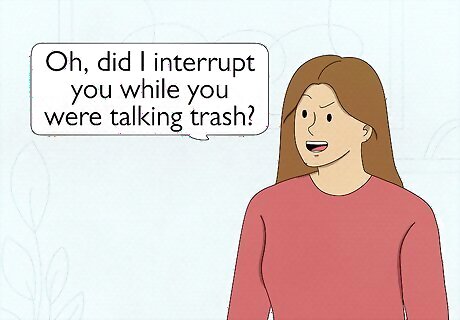
Remind them that they’re not so special. This one is great if someone is being rude or has a reputation for trash-talking. It shows them that they can’t disrespect people and get away with it. Not around you, at least. Standing up to a trash-talker empowers other people to stand up for themselves too. Chances are, you’re not the only person whose feelings have been hurt by this person.
“Don’t tell me to shut up.”
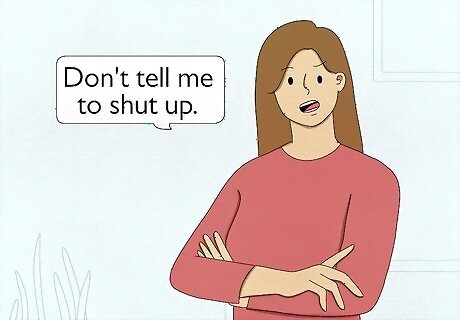
Be blunt and show them they can’t push you around. Bullies love to be controlling, so nothing gets under a bully’s skin like having someone talk back to them. They might try to laugh it off, but they can’t fool anyone. You have every right to stand up to them. You can also say “You can’t talk to me like that” or something similar. The goal is to show them that they can’t say whatever they want.
“I think there’s been a misunderstanding.”

Use this when an honest miscommunication occurs. A person may get offended if they misunderstand what you say, or if you accidentally phrase something in a hurtful way. Acknowledging this can help everyone move forward amicably.
“Who put you in charge?”

Nobody did. Someone should remind them, so why not you? Avoid using this with someone that actually is in charge, like a leader or authority figure.
“You may be in charge, but you can’t speak to me like that.”
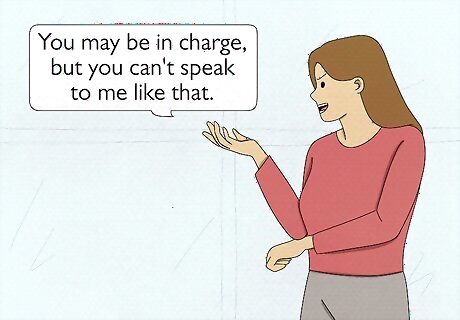
Use this when someone actually is in charge and is abusing their authority. Being a leader, teacher, or boss doesn’t give someone a right to humiliate or mistreat you.
“That’s a really rude thing to say.”
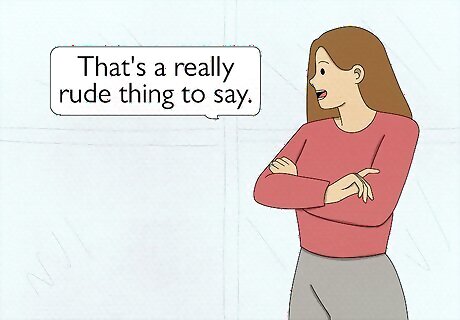
Be blunt, but mature. Telling someone to shut up is rude, and unless you said something inappropriate first, they deserve to know that they’ve crossed a line.
“I’m sorry.”

Apologize if you think you’re in the wrong. Sometimes, a person may tell you to shut up if you’ve hurt their feelings or said something inappropriate. Don’t sweat it. It happens to all of us. Bring it up with them later if you’re not sure what you did wrong. Someone may get offended for lots of different reasons, and it never hurts to own up to your mistakes.
Laugh at them sarcastically.

Saying “ha ha ha” works in all kinds of situations. For bullies, it shows you’re not intimidated. For friends, it can de-escalate things by telling them they’re not funny, without being too mean. And for crushes, it can be flirty—especially if they’re saying “shut up” to tease you. It’s best not to say “ha ha ha” if someone is genuinely upset with you, since it can seem dismissive. In those situations, it’s best to apologize when you get the chance.
Put up your hand and keep talking.

Body language can speak volumes. Putting up your hand and ignoring them is the equivalent of saying “I don’t need to listen to you.”
Just ignore them.

Ignoring someone can be a total power move. It demonstrates that you don’t take them seriously, and that their words don’t affect you. True, you might still feel angry or hurt, but you don’t have to admit it—especially to someone who is being mean. Ignoring someone works best if they’re trying to get your attention.




















Comments
0 comment